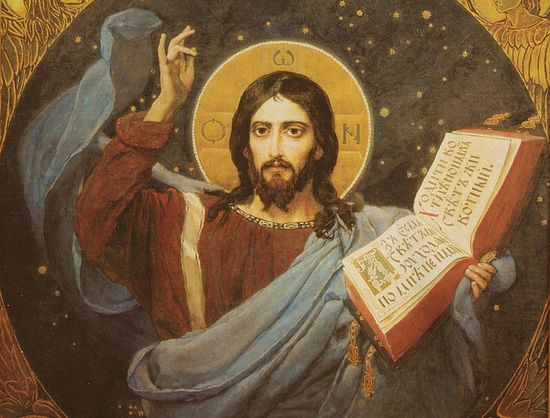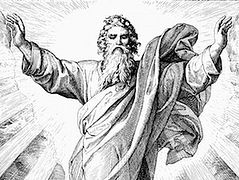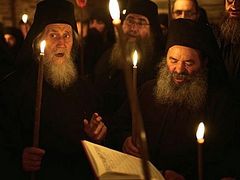In the name of the Father, and of the Son, and of the Holy Spirit!
In the Gospel of Luke, following Christ’s Resurrection, we are told that Christ taught His disciples all the things in the Law, the Prophets, and the Psalms concerning Himself. If Christ thought it was important for His Apostles to learn all this at that crucial moment in His earthly ministry, then I think it is important for us to go with some regularity to the Old Testament and have a look, to see those very same things that Christ showed His disciples. Today, I’d like to talk about Psalm 110 (or Psalm 111 in the King James Version), which is the Psalm from which the Communion hymn for the feast of the Nativity is taken.
“I will confess Thee, O Lord, with my whole heart, in the council of the upright and in the congregation.”1 The word “confess” here also means “thanksgiving.” When we confess our sins to God, of course, we are confessing that which is bad and for which we have reason to be ashamed. However, when we confess to God or to other people the works that God has done for us, it’s an act of thanksgiving and a joyful activity. And it says that we are to do it with our whole heart—it’s not something that we should just give lip service to, just saying the words—we should do it from a deep sense of belief in what God has done. Also, when it says “in the counsel of the upright and in the congregation,” in Hebrew, the word “counsel” refers to a select group of people. It says the “counsel of the upright,” or, in other words, to the most pious friends you have, you should confess with your whole heart all that God has done. Then, it says “in the congregation,” in other words, in the midst of all the people—you should do it in every situation that you’re in.
“Great are the works of the Lord, sought out in all the things that He hath willed.” God’s works are great and the phrase “all things that He hath willed” is a parallelism. In Hebrew, you’ll very often find that you have a phrase that will say something and the next phrase will refer back to that same thing that was in the first phrase but will say it in a different way. So, when it says “all things that He hath willed” it’s referring back to those great works that God has done. But it says, “sought out in all things that He hath willed.” When it speaks about these things being sought out, who are they being sought out by? They’re sought out by the faithful. In other words, the righteous meditate on God’s works and all that He has done throughout history. We read the Scriptures, we read the lives of the saints, and we ponder and want to know all of the things that God has done in history because it gives us faith—it emboldens our faith and trust in what He will yet do.
“Confession and majesty are His works, and His righteousness abideth unto the ages of ages.” God’s majestic works inspire confession of His works; in other words, they inspire thanksgiving, as I have said. All that God does is righteous, and when all has been revealed and God’s purposes are finally made clear, we will all say with the psalmist as in Psalm 18, “the judgments of the Lord are true, altogether justified.” “He made a remembrance of His wondrous deeds.” That could also be translated as “He makes to be remembered His wondrous deeds.” We should strive to take heed and to remember those things that God has done. We should meditate on these things, not only in Scripture, but also in Church history, and in the lives of the saints. I think that, in some ways, when we read the lives of saints that are more recent in time to us, their story has a more powerful effect upon us because it helps us to see that it wasn’t just something that happened way back when, but that God continues to do these things that we read about in the Scripture.
“Merciful and compassionate is the Lord.” The psalmist spoke of God’s righteousness in the previous verse and now he’s joining that to mercy. If God only revealed Himself as righteous, we would have no hope, because we’re sinners. We need a merciful and compassionate Savior, and He desires to make us righteous by His grace, so that on the Day of Judgment we will not be ashamed. “He hath given food to them that fear him. He will be mindful for ever of His covenant.” He certainly provides us with our daily bread, but He also provides us with spiritual food, and that’s the primary thing that is in view here. God will give us everything that we need in any situation. There have been many martyrs in the history of the Church that were starved to death by their tormenters. This verse did not fail in their case because although they did not get bodily nourishment, God gave them the spiritual strength they needed to remain steadfast in their faith and to not give in to their tormentors.
“The power of His works hath He declared unto His people, that He may give them the inheritance of the nations.” In the Old Testament, God declared the power of His works by driving out the nations before His people and giving them the land. In the New Testament, Christ made the blind to see and the lame to walk, and then He died on the cross, and rose again from the grave. And He did that not only to enlighten the Jews who were already His people, but that the nations might be brought into the New Israel, the Church, as an inheritance. “The works of His hands are truth and judgment. Faithful are all His commandments, confirmed unto ages of ages, made in truth and uprightness.” God is truth and everything that He does is in accordance with truth and righteousness. His commandments do not fail—there is nothing in Scripture that we are going to find to be false. His commandments are faithful, and when we are faithful to His commandments, God establishes us and preserves us. St. John, in his first Epistle, says in chapter 3, verse 22: “And whatsoever we ask, we receive of him, because we keep his commandments, and do those things that are pleasing in his sight.”2 Then, in verse 24, he says: “And he that keepeth his commandments dwelleth in him, and he in him.”3
“He hath sent redemption unto His people.” This is the Communion hymn of Nativity that I referred to earlier. He sent redemption to the Israelites when He brought them out of Egypt, and he sent redemption to the Jews who were in Babylonian captivity when He brought them back to the land. But the most perfect fulfilment of His words is when He finally sent redemption to His people by becoming incarnate of the Virgin Mary and coming to live the life that we could never live, to die in our place, and to rise again from the dead, in order that, by raising up our nature to the Heavens, we too could be saved. “He hath enjoined His covenant for ever.” He, by His eternal command, has established the covenant, which is the means by which we were redeemed—His death and resurrection—and it is an everlasting covenant. We may waver, but God’s promise of salvation is eternal and steadfast.
“Holy and terrible is His name.” When it says that God’s name is terrible, it means “awesome,” worthy of reverence and fear. That is one of the reasons why it is very important for us to pay attention to the commandment and not take the name of the Lord our God in vain. We shouldn’t use His name lightly; we shouldn’t speak of it in a blasphemous way. We shouldn’t bear the name of Christian in vain, by living life as if we were really not Christians but nevertheless bringing shame on the name of God because people know that we are at least ostensibly Christian.
“The fear of the Lord is the beginning of wisdom; and all they that foster this have a good understanding.” It is only when we have the fear of the Lord that we can truly begin to acquire wisdom. In this verse, the psalmist is making reference to the wisdom literature in Scripture. The wisdom literature is one of the easiest parts of Scripture to read because it is so easy to put it into practice. It is very practical advice, so it is a good idea to read a chapter from this section of Scripture every day along with, of course, chapters from other sections as well. This is a section of Scripture that we should not neglect because it gives us a great deal of very practical spiritual advice.
“His praise abideth unto ages of ages.” We will ever praise Him, but that praise has to begin in this life if we are to take part in that praise eternally. In this final verse, the psalmist returns to the beginning of the psalm, where it says “I will confess Thee, O Lord, with my whole heart, in the counsel of the upright and in the congregation.” We need to continually praise Him in our life, in our actions, in our deeds, and we need not forsake the assembling of ourselves together as St. Paul says in the book of Hebrews. We should come together to worship as often as we are able, as a community, so that we can sing God’s praises together. In Psalm 26:4, it says: “One thing have I asked of the Lord, this will I seek after: That I may dwell in the house of the Lord all the days of my life, that I may behold the delight of the Lord, and that I may visit His holy temple.” In Psalm 83:4 it says: “Blessed are they that dwell in Thy house; unto ages of ages shall they praise Thee.” Amen.
For audio file, please see From the Amvon




